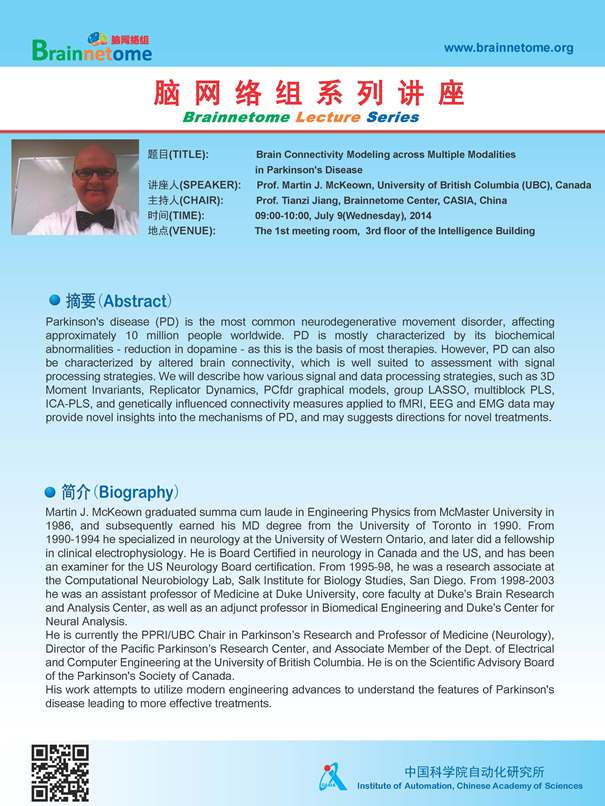Dr. Mckeown' Lecture -- Brain Connectivity Modeling across Multiple Modalities in Parkinson's Disease
Title: Brain Connectivity Modeling across Multiple Modalities in Parkinson's Disease
Speaker: Prof. Martin J. McKeown, BEng, MD, FRCP(C),University of British Columbia (UBC), Canada
Chair: Prof. Tianzi Jiang, Brainnetome Center
Time: 09:00-10:00 July 9, 2014
Venue: The first meeting room, 3rd floor of the Intelligence Building
If you want to attend it, please contact to Dr. Yong Liu by yliu@nlpr.ia.ac.cn
[Abstract]
Parkinson's disease (PD) is the most common neurodegenerative movement disorder, affecting approximately 10 million people worldwide. PD is mostly characterized by its biochemical abnormalities - reduction in dopamine - as this is the basis of most therapies. However, PD can also be characterized by altered brain connectivity, which is well suited to assessment with signal processing strategies. We will describe how various signal and data processing strategies, such as 3D Moment Invariants, Replicator Dynamics, PCfdr graphical models, group LASSO, multiblock PLS, ICA-PLS, and genetically influenced connectivity measures applied to fMRI, EEG and EMG data may provide novel insights into the mechanisms of PD, and may suggests directions for novel treatments.
[Biography]
Martin J. McKeown graduated summa cum laude in Engineering Physics from McMaster University in 1986, and subsequently earned his MD degree from the University of Toronto in 1990. From 1990-1994 he specialized in neurology at the University of Western Ontario, and later did a fellowship in clinical electrophysiology. He is Board Certified in neurology in Canada and the US, and has been an examiner for the US Neurology Board certification. From 1995-98, he was a research associate at the Computational Neurobiology Lab, Salk Institute for Biology Studies, San Diego. From 1998-2003 he was an assistant professor of Medicine at Duke University, core faculty at Duke's Brain Research and Analysis Center, as well as an adjunct professor in Biomedical Engineering and Duke's Center for Neural Analysis.
He is currently the PPRI/UBC Chair in Parkinson's Research and Professor of Medicine (Neurology), Director of the Pacific Parkinson's Research Center, and Associate Member of the Dept. of Electrical and Computer Engineering at the University of British Columbia. He is on the Scientific Advisory Board of the Parkinson's Society of Canada.
His work attempts to utilize modern engineering advances to understand the features of Parkinson's disease leading to more effective treatments.

